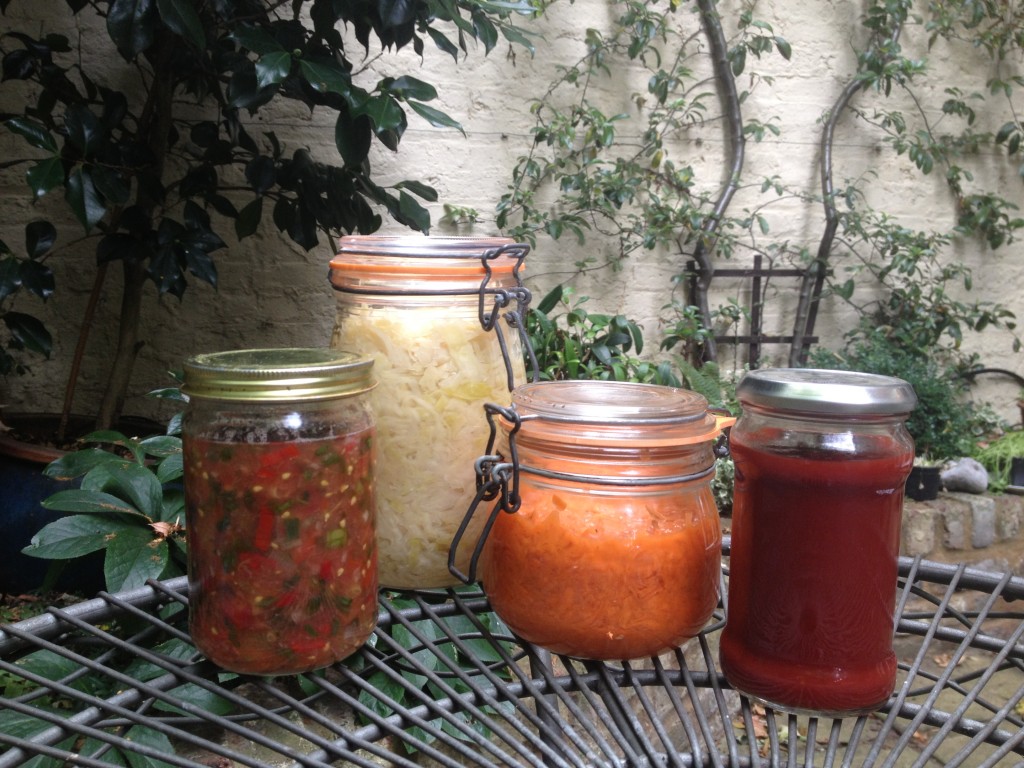 Fermentation is an ancient process, preceding human history. It also occurs in the cells of our bodies. It is the transformative action of microorganisms (bacteria or yeasts) as well as the enzymes they produce. People have long studied and played with the technique which is both a science and an art. Ferments, like the condiments below, are a collaboration with microbes; we manipulate the environmental conditions to select the bacteria we want to thrive, then sit back while they do all the work. We add the flavours and the finishing touches to make unique eatables. A culinary symbiosis of bacteria and man!
Fermentation is an ancient process, preceding human history. It also occurs in the cells of our bodies. It is the transformative action of microorganisms (bacteria or yeasts) as well as the enzymes they produce. People have long studied and played with the technique which is both a science and an art. Ferments, like the condiments below, are a collaboration with microbes; we manipulate the environmental conditions to select the bacteria we want to thrive, then sit back while they do all the work. We add the flavours and the finishing touches to make unique eatables. A culinary symbiosis of bacteria and man!
It is estimated that a third of our cuisine globally is fermented; yoghurts, cheese, tofu, bread, vinegar, alcohol and so on, although of course many items today are now highly processed, made as quickly as possible and pasteurised to kill off any bacteria. The word ‘ketchup’ comes from an old Indonesian word ‘Ketjap’ which is a fermented sauce and until only a couple of hundred years ago all breads would have been made from a sourdough starter culture, using beneficial bacteria. Through time people have fermented for many reasons; to produce alcohol, for preservation, for the flavours; in a time of environmental awareness and concern some people choose to ferment to reduce their reliance on refrigeration.
The bacteria that we want to encourage into our products in order to access their health benefits are lactic acid bacteria, also known as or lactobacilli or LAB. The term lacto-fermentation is also used to describe the work they do. These bacteria are found on all plants but in relatively low numbers due to other types of bacteria dominating in the natural environment.
As the LAB transform their ingredients they produce nutritional benefits. Phytate bonds are broken away making the minerals more accessible, proteins are taken apart into peptides and amino acids, reducing their allergenic potential. It is as though the ingredients were predigested for us! B vitamins can be increased (B1, B2 and B3 in particular) and anti nutrients or toxins such as nitrates and also oxalates, related to kidney stones, are removed.
As long as the finished product is not cooked or pasteurised then the LAB will still be intact and can be taken into our digestive systems. Unfortunately this rules out most fermented products available in supermarkets and even health food shops. This is why there is such a great need for us to ferment at home and the reason why there is a lacto-fermentation revival happening.
The microbial ecology of the gut is an area of vast amounts of current interest and research for science and medicine. Probiotics are being investigated for their healing capabilities in digestive and immunity disorders. Larger trials continuing on from the successful Swansea Baby Study may well see probiotic supplements being given to newborns for six months on the NHS because of the 57% reduction in atopic eczema found in the preliminary study after 2 years. Dr Campbell-McBride’s work looks at a connection between the gut and psychological issues.
Lacto-fermented foods are not going to contain the same amounts of beneficial bacteria that a probiotic supplement will do, there is a big difference between the two. However homemade ferments are part of a bigger picture of health and wellbeing. Sandor Katz particularly emphasises using wild foods in your recipes for the genetic variety and diversity they contain and are able to enrich your gut flora with. Fermented foods are special, deeply nourishing foods.
Information in this post comes thanks to The Art of Fermentation by revivalist Sandor Katz.


Pingback: Colostrum for intestinal permeability (leaky gut) | Katie Clare
Pingback: how to make sauerkraut?
Pingback: Mango & Chilli, Coconut Kefir Ice Cream